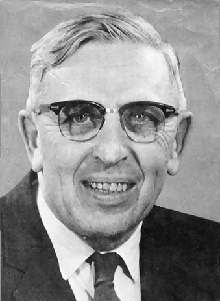
Catherine Lucille Moore was an American science fiction and fantasy writer, who first came to prominence in the 1930s writing as C. L. Moore. She was among the first women to write in the science fiction and fantasy genres, though earlier woman writers in these genres include Clare Winger Harris, Greye La Spina, and Francis Stevens, amongst others. Nevertheless, Moore's work paved the way for many other female speculative fiction writers.

Richard Burton Matheson was an American author and screenwriter, primarily in the fantasy, horror, and science fiction genres.

The Incredible Shrinking Man is a 1957 American science fiction film directed by Jack Arnold based on Richard Matheson's 1956 novel The Shrinking Man. The film stars Grant Williams as Scott and Randy Stuart as Scott's wife Louise. While relaxing on a boat, Scott is enveloped by a strange fog. Months later, he discovers that he appears to be shrinking. By the time Scott has reached the height of a small boy, his condition becomes known to the public. When he learns there is no cure for his condition, he lashes out at his wife. As Scott shrinks to the point he can fit into a doll house, he has a battle with his family cat, which leaves him lost and alone in his basement, where he is now smaller than the average insect.

Alfred Bester was an American science fiction author, TV and radio scriptwriter, magazine editor and scripter for comic strips and comic books. He is best remembered for his science fiction, including The Demolished Man, winner of the inaugural Hugo Award in 1953.

Michael Swanwick is an American fantasy and science fiction author who began publishing in the early 1980s.
![Robert Silverberg Writer (1935−[[Category:Errors reported by Module String]]String Module Error: Target string is empty)](https://upload.wikimedia.org/wikipedia/commons/thumb/6/6d/Robert_Silverberg.jpg/251px-Robert_Silverberg.jpg)
Robert Silverberg is an American author and editor, best known for writing science fiction. He is a multiple winner of both Hugo and Nebula Awards, a member of the Science Fiction and Fantasy Hall of Fame, and a Grand Master of SF. He has attended every Hugo Awards ceremony since the inaugural event in 1953.
The Hugo Award for Best Short Story is one of the Hugo Awards given each year for science fiction or fantasy stories published or translated into English during the previous calendar year. The short story award is available for works of fiction of fewer than 7,500 words; awards are also given out for pieces of longer lengths in the novelette, novella, and novel categories. The Hugo Awards have been described as "a fine showcase for speculative fiction" and "the best known literary award for science fiction writing".
"The Laughing Man" is a short story by J. D. Salinger, published originally in The New Yorker on March 19, 1949; and also in Salinger’s short story collection Nine Stories. It largely takes the structure of a story within a story and is thematically occupied with the relationship between narrative and narrator, and the end of youth. The story is inspired by the 1869 Victor Hugo novel of the same name: The Man Who Laughs.
"Jeffty Is Five" is a fantasy short story by American author Harlan Ellison. It was first published in The Magazine of Fantasy & Science Fiction in 1977, then was included in DAW's The 1978 Annual World's Best SF in 1978 and Ellison's short story collection Shatterday two years later. According to Ellison, it was partially inspired by a fragment of conversation that he misheard at a party at the home of actor Walter Koenig: "How is Jeff?" "Jeff is fine. He's always fine," which he perceived as "Jeff is five, he's always five." Ellison based the character of Jeffty on Joshua Andrew Koenig, Walter's son. He declared:
... I had been awed and delighted by Josh Koenig, and I instantly thought of just such a child who was arrested in time at the age of five. Jeffty, in no small measure, is Josh: the sweetness of Josh, the intelligence of Josh, the questioning nature of Josh.

The Cat's Pajamas: Stories (2004) is a collection of short stories by Ray Bradbury. Its name of its title story comes from a phrase in English meaning a sought after and fancy thing. Another collection by the same name was published in the same year by fellow science fiction author James Morrow.

"To Serve Man" is a science fiction short story by American writer Damon Knight. It first appeared in the November 1950 issue of Galaxy Science Fiction and has been reprinted a number of times, including in Frontiers in Space (1955), Far Out (1961), and The Best of Damon Knight (1976).

Raymond Fisher Jones was an American science fiction author. He is best known for his 1952 novel This Island Earth, which was adapted into the eponymous 1955 film.

"Coming Attraction" is a science fiction short story by American writer Fritz Leiber, originally published in the second issue of Galaxy Science Fiction with illustrations by Paul Callé. The story was nominated for a Retro Hugo Award in 2001.
"The Dog Said Bow-Wow" is a science fiction short story by American writer Michael Swanwick, published in 2001. It won the 2002 Hugo Award for Best Short Story and was nominated for the 2002 Nebula Award for Best Short Story. The Dog Said Bow-Wow is the title story of his 2007 short story collection, published by Tachyon Publications, and was reprinted in the same year in Rewired: The Post-Cyberpunk Anthology.

The Shrinking Man is a science fiction novel by American writer Richard Matheson, published in 1956. It has been adapted into a motion picture twice, called The Incredible Shrinking Man in 1957 and The Incredible Shrinking Woman in 1981, both by Universal Pictures. The novel was retitled The Incredible Shrinking Man in some later editions.

The Hugo Award for Best Graphic Story is given each year for science fiction or fantasy stories told in graphic form and published or translated into English during the previous calendar year. It has been awarded annually since 2009. The Hugo Awards have been described as "a fine showcase for speculative fiction" and "the best known literary award for science fiction writing".

Clifford Donald Simak was an American science fiction writer. He won three Hugo Awards and one Nebula Award. The Science Fiction Writers of America made him its third SFWA Grand Master, and the Horror Writers Association made him one of three inaugural winners of the Bram Stoker Award for Lifetime Achievement.
"Light of Other Days" is a science fiction short story by Irish writer Bob Shaw. It was originally published in August 1966 in Analog Science Fiction and Fact. The story uses the idea of "slow glass": glass through which light takes years to pass. Bob Shaw used this idea again in later stories.
"The Compleat Werewolf" is a 1942 fantasy short story by Anthony Boucher. It was first published in Unknown Worlds.

The Best of C. M. Kornbluth is a collection of science fiction and fantasy short stories by American author C. M. Kornbluth, edited by Frederik Pohl. It was first published in hardback by Nelson Doubleday in October 1976 and in paperback by Ballantine Books in January 1977 as a volume in its Classic Library of Science Fiction. A second hardcover edition was issued by Taplinger in November 1977, and an ebook edition by Faded Page in December 2017.





![Robert Silverberg Writer (1935−[[Category:Errors reported by Module String]]String Module Error: Target string is empty)](https://upload.wikimedia.org/wikipedia/commons/thumb/6/6d/Robert_Silverberg.jpg/251px-Robert_Silverberg.jpg)






